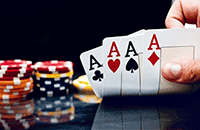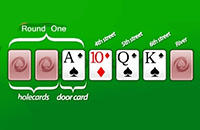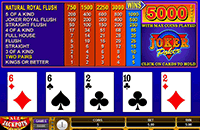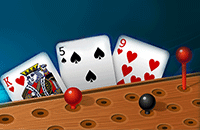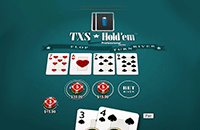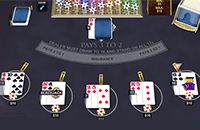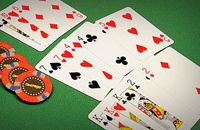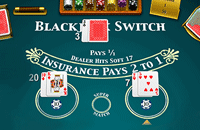Poker Terms Glossary
It’s imperative to know the basic Poker terms and definitions before you begin playing online. We have put together this extensive list of glossary terms for easy reference to assist you in your gameplay. Combine these with our Poker hand rankings to help you become a pro before you know it!
A
Ace-High – A hand that contains an Ace as the highest card and no other Pair, Straight or Flush.
Aces Full – Full House or Boat that consists of three Aces and any pair. The best Aces Full hand is three Aces with two Kings; the lowest value is three Aces and two Deuces.
Aces Up – A hand that contains Two Pair that consists of a pair of Aces and any other Pair. The best Aces Up hand is a pair of Aces with a pair of Kings; the lowest value is a pair of Aces and a pair of Deuces.
Action – Depending on the situation, “Action” can have numerous meanings, however, it will normally refer to a players turn to act in a hand, e.g. bet, call or fold.
Active Player – This can refer to a player who plays lots of pots or any player still in a particular hand.
Add-On – In a Multi-Table/Scheduled Tournament, some are set as Re-Buys. In this case, players can often have an Add-On as well, which is to buy more chips for a set price – this is normally the same cost as an initial Buy-In with the same number of chips as each Re-Buy. The Add-On period is normally at the end of the Re-Buy period for 5 minutes, which often co-insides with a break in play.
Aggressive – A player that bets a large number of chips very often, even when they may have a poor hand.
All-In – When a player commits all their chips to the active pot, they are “All-In” and cannot bet any further chips as they have none available to them.
Anna Kournikova – A popular name for Ace-King as a starting hand in Hold’em – AK.
Ante – A ‘forced’ pre-flop bet which is made by all players for an equal amount, normally 10% of the value of the Big Blind. This often occurs in the latter stages of a tournament to ensure it completes in a timely fashion and it increases the same time the Blinds increase.
B
Bad Beat – This can refer to an exceptional hand which is beaten by an even better hand – such as 4 Aces losing to a Straight Flush (there is often a Bad Beat Jackpot that can pay out in these situations). It can also refer to a hand which is beaten on the River by a hand that required a very low number of outs – such as 3-of-a-kind Kings being beaten by 4-of-a kind Queens when the one remaining Queen hits on the River.
Bankroll – The amount of money – normally displayed in Chips – that a player has available to them to play with, it is normally only referred to in Cash Games.
Bankroll Management – How a player manages their Bankroll to ensure they have enough chips to play poker for the amount of time they have set aside for play. A very important aspect for all professional players to consider.
Bet – One of the Actions available to each player when it is their turn to act, if no other player has bet funds in that particular betting round, the player next to act can Bet which ensures all other active players need to Call the Bet in order to stay in the hand.
Bet the Pot – This is when a player Bets and the amount equal to the Pot amount including any Bet they need to make in order to Call the current Bet. Most online Poker rooms have the option to Bet Pot which works out the required amount for you.
Big Blind – A forced Bet made by the player 2 positions to the left of the Dealer button in a hand of poker that uses Blinds as opposed to Antes. The 2 most popular forms of poker, Texas Hold’em and Omaha, use this method of betting. The bet is made before any cards are dealt, and the amount depends on the table limit for Cash Games or the level for Tournaments. The player needing to place the Big Blind changes each hand as the Dealer Button rotates around the table.
Big Slick – Another name for the starting hand Ace-King.
Blind – A forced Bet that 2 specific players need to place each hand before the Hole Cards are dealt – there is a Small Blind and a Big Blind Bet, the Big Blind is normally twice the size of the Small Blind.
Bluff – A Bet/Raise made by a player with the aim of getting other players to Fold, it is designed to make it look that they have a better hand than they actually do and can result in a player winning a hand they would have lost at Showdown or losing a much higher amount than they would have without the Bluff.
Board/Board Cards – In Community games such as Texas Hold’em and Omaha, the Board is the 5 Community Cards that are dealt which all players are able to use.
Bottom Pair – In variations that use Community cards, the Bottom Pair is a Pair made from the lowest card on the Board along with 1 of the player’s Hole cards.
Bounty – The Bounty is a feature in some tournaments which sees some of the Buy-Ins for each player go to whoever knocks them out of the tournament. This is in addition to the Prize Pool which goes to the players lasting the longest.
Bubble – In a tournament, the player to get knocked out immediately before the money starts being paid is known as the Bubble – the player finishing highest who didn’t ‘Make the Money’.
Bullets – Another name for Hole cards that are both Aces – the best starting hand you can be dealt.
Button – This signifies the Dealer for a specific hand and also determines the Small Blind, Big blind and player that starts each betting round for a particular hand. It moves clockwise around the table after each hand has finished ensuring it is fair on all players. When playing live, the player ‘On the Button’ may have to physically shuffle and deal the cards, however, when playing online this is done automatically.
Buy-In – In a Cash Game, the Buy-In is the amount in Chips a player brings to the table – the minimum and maximum amount allowable depends on table limits. When playing in a tournament, each player pays a Buy-In along with a Fee, the Buy-In goes into the Prize Pool which is distributed amongst the winners at the end of a tournament.
C
Call – An action a player makes when another player in the hand has already placed a Bet. All players need to Call the highest bet in order to stay in the hand.
Calling Station – A name for a player that Calls nearly all of the time as opposed to Folding or Raising. They will end up as a losing player in the long term.
Cash Game – A poker game where each player brings their own money to the table in the form of chips, they can walk away at any time with the chips they have in front of them unlike in a tournament when all players start with the same Buy-In and Fee but need to play until they get knocked out or the tournament finishes before any winnings can be cashed in. Also known as a Ring Game.
Check – At the start of any Betting Round except the first in a hand, the first player to Act can decide not to Bet any more Chips and to simply Check – not put any further Chips into the pot. All other players can then choose to do this as well, however, if one player decides to Bet then all other players need to Call in order to stay in the hand. In the first Betting Round, the player on the Big Blind can also Check if no other players have Raised, as they have already placed a forced Bet and therefore don’t need to Bet more Chips if no other players have done so.
Community Cards – In variations of Poker where cards are dealt in the middle of the table to all players – such as Texas Hold’em and Omaha – Community Cards are those cards that all players can use. Also known as Board Cards.
D
Dealer – The player in the hand determined to be in the Dealer position, other positions such as Small Blind and Big Blind, as well as the player to act first each Betting round, are determined from this position.
Dealer’s Position – A ‘Button’ is used to show the position of the Dealer which changes each hand and rotates clockwise around the table.
Disconnect Protection – In online poker, if a player gets disconnected during a hand, many sites have Disconnection Protection to ensure they don’t automatically get folded. If a player fails to reconnect within the allotted timeframe and Disconnection Protection is enabled for that Tournament/Table, they are treated as ‘All In’ and can still win the Pot that has been bet up until the point of disconnection. Any other players that remain in the hand can continue betting with further chips going to a Side Pot that only those players can win.
Drawing Dead – When a hand cannot mathematically win irrespective of the remaining cards that can be drawn, they are said to be ‘Drawing Dead’. An example would be when a player has a Flush after the Turn card but the other player only has 1 Pair with no chance of making a Flush or higher with the River Card.
E
Early Position – The players that act first in a hand are said to be in ‘Early Position.’ This is considered a disadvantage, as several other players still have to act so you have no information as to what cards these players may have. As the Dealer Button moves after every hand, all players take turns in being in Early Position, Mid Position, and Late Position.
Entry Fee – A fee – normally 10% of the Buy-In – charged to enter a Tournament which goes to the Poker site/Casino in return for running it.
F
Family Pot – An informal term for a pot where most players are active as opposed to folding.
Fish – A player thought to be very poor or easy to win against which all good players – often known as Sharks – enjoy playing with.
Flop – The first 3 Community Cards dealt in Texas Hold’em and Omaha which all players remaining in the pot are able to use.
Flush – A hand that consists of 5 cards of the same suit that aren’t in numerical order. It beats a Straight but is not as good as a Full House.
Flush Draw – When a player has 4 cards of the same suit and requires one more to complete a Flush, they are said to be on a ‘Flush Draw’.
Fold – When a player decides they don’t want to continue in a hand, if another player has already Bet then a player will need to Fold and give up their hand and chance of winning the Pot as opposed to Calling and paying more funds into the Pot.
Forced Bet – The necessary Bets that players need to pay before the Cards in a Hand are dealt, this ensures that there are always funds in the Pot for players to compete for.
Four of A Kind – A hand containing 4 cards of the same value and any other ‘Kicker’ card. The best hand would be 4 of a Kind Aces with a King kicker, the lowest value 4 of a kind 2’s with a 3 kicker. 4 of a Kind beats a Full House and below but will lose to a Straight Flush or Royal Flush.
Freeroll – A Tournament that has no Buy-In or Entry Fee but which has real value prizes for the top finishers. You will find almost all Poker sites offer a range of Freerolls every day, some of which are free for all players, some of which may have certain requirements that need to be met such as earning Poker Points in the 7 days before to qualify.
Full House – A Hand consisting of 1 Pair and 3 of a Kind. It is also known as a ‘Boat’ and is described as the 3 of a Kind over the Pair. For example, a Full House Aces over 3’s would mean a player has 3 Aces and 2 3’s. A Full House will beat all Flushes and below but lose to 4 of a Kind or better. When two players have a Full House, the higher 3 of a Kind will win, if these are the same then the higher Pair will win the Pot.
G
Gut Shot – When a player has 4 cards to a Straight but needs a card on the inside to complete it. An example would be if you hold 5,6,8 and 9, only a 7 would complete the Straight.
H
Hand – 5 cards that make up your final total in a round of Poker, this determines whether you win the Pot or not when a round goes to ‘Showdown’.
Heads-Up – When only 2 players are in a hand of Poker, this could be at the end of a Tournament when only 2 players are left or on a cash table when only 2 players are active and playing.
High-Card – The lowest possible Hand in poker when none on the other rankings have been achieved. You are highly unlikely to win a Pot with a High-Card.
High Limit – A game of poker where players can bet large amounts and are often required to pay large Blinds. Each Poker room has different table limits you can choose from including High Limit tables allowing players that choose to do so to bet a large amount.
Hold’em – The most popular of Poker variations, also known as Texas Hold’em. You will find when playing Poker online that many more players take part in Hold’em games and Tournaments than Omaha or 7-Card Stud.
Hole Cards – The cards a player is dealt at the start of a hand that only they can see. The number received is different depending on the variation being played. For example in Texas Hold’em, all players receive 2 Hole Cards whilst in Omaha they receive 4.
I
In The Money – Towards the end of a Tournament when most players have been knocked out, the remaining players get paid depending on where they finish. These players are all said to have finished ‘In the Money’.
J
Jackpot – These can vary from poker room to poker room but many have a jackpot depending on what happens during a hand which increases over time. Examples would be a Bad Beat Jackpot that pays out if a player loses a hand with very good cards, such as 4 of a Kind Aces being beaten by a Straight Flush. Other rooms may have a Royal Flush Jackpot which is won by anyone who wins a hand with a Royal Flush.
K
Kicker – In hands that only use 3 or 4 cards – such as 2 pair or 3 of a Kind – a Kicker card or cards are added to make the hand up to 5 cards. An example would be if a player has a pair of 4’s and 6’s, the highest card available to them which would be their Kicker, if that card was a King, their hand would be 2 Pair 6’s over 4’s with a King Kicker. The Kicker helps determine the winner of a hand when players have the same 2 pair/3 of a Kind.
L
Ladies – Slang term for a Pair of Queens.
Late Position – A player that acts after most other players at the start of a Hand is said to be in ‘Late Position’. This can be an advantage as you will have an idea of what most other players at the table have and whether anyone has Raised. As the Dealer Button moves around the table every hand, players take turns being in Early Position, Mid Position, and Late Position.
Limit Poker – A game of Poker where you have less control over the amount you can Bet each time. In Limit Poker – most commonly seen in 7 Card Stud as opposed to Texas Hold’em or Omaha – you can only decide whether to Bet, Call or Fold as this is determined by the table limits or tournament levels.
Limp – A player that calls at the start of a Betting Round in the hope of seeing the next card/s for a minimum amount is said to have ‘Limped In’ as opposed to Raising or Betting big.
Live Hand – A Hand that is still in the game and is able to win the Pot at the end of the Betting Rounds as opposed to Hands that have been Folded.
Low Limit – The opposite of High Limit, games where players can only bet a relatively small amount and sit down at a table with a small amount at the start of a session.
M
Main Pot – The Pot that all players in a Hand are able to win. If one or more players bet all of their Chips at any time, if other players are still active and wish to continue Betting, a separate Side Pot is made that is between only the players that have contributed to it.
Middle Pair – After the Flop in Community Games such as Texas Hold’em and Omaha, any player that has a card in their hand equal to the 2nd highest card on the Board is said to have a Middle Pair as opposed to a Top Pair or Bottom Pair.
Middle Position – A player that acts in the middle of the players prior to a hand of Poker is known as being in Middle Position. This is considered better than Early Position as you will have an idea of what some players have but not so much as a player in Late Position who will have the advantage.
Minimum Buy-In – When sitting down at a Cash Table, you will be able to take a set amount of Chips with you related to the Blinds at that table. There are Minimum Buy-In and Maximum Buy-In which is the amount you will start the first hand with.
MTT – A Multi-Table Tournament, also known as a Scheduled Tournament. This is a Tournament that starts at a specific time as long as the minimum number of players has been met.
Muck – At the end of a Hand which goes to Showdown, the player to the left of the Dealer has to show their cards. If the following player cannot equal or beat the Hand, they can Muck which means admit defeat but not show other players what you had. If you have the same or better hand you can therefore still win the Pot but you will need to Show your cards as proof and will be unable to Muck your Hand.
N
No Limit – A Betting Limit where you can bet as much as you wish every Betting Round up to the number of Chips you have in front of you. Other Betting Limits are Pot Limit or Fixed Limit, sometimes known as just Limit.
Nuts – At a point in a hand, a player has the best 2 cards possible in their hand, and are said to have the ‘Nuts’ which means no other player can beat them. This can change after every new Community Card is dealt, but if you have the ‘Nuts’ after the River card has been dealt, you cannot lose the hand as you have the best hand possible.
O
Odds – This term refers to the chance of you getting the card/s you need to complete a hand. The best hands are less likely to be dealt and therefore have longer odds. As an example, the odds at the start of a hand of getting a pair are 1.37 to 1, whilst the odds of hitting a Royal Flush are 649,740 to 1.
Off Suit – When you are dealt your Hole cards in Texas Hold’em, if they are different Suits they are known as Off Suit, 2 cards of the same Suit are known as Suited. Suited cards give you a better chance of getting a Flush as you only need 3 more of the Suit on the Board to hit it. Suited cards are therefore considered better than Off Suit ones.
On the Button – The player in the Dealer position, with the Dealer Button in front of them, is ‘On the Button’ for that particular hand.
On Tilt – If a player has lost a big Pot or suffered a Bad Beat, they can often try to win the Chips back by playing more hands and playing differently to normal. They are said to be On Tilt which is a bad thing to be as you aren’t thinking straight and are more likely to lose.
Open-Ended Straight Draw – A player that has 4 cards of a Straight when the card they need can be at either end has an Open-Ended Straight Draw as opposed to an Inside Straight Draw. There is more chance of hitting and Open-Ended Straight Draw as 2 values will help as opposed to one. An example would be someone who has 7,8,9 and 10, they need either a 6 or a Jack to complete the Straight.
Over Pair – If you have a Pair in your Hole cards which is higher in value than any of the Community Cards, this is known as an Over Pair. An example would be if you have 2 Jacks in your hand and the Flop comes down 4,7,9.
P
Pair – 2 cards of the same value, such as 2 8’s. This hand would beat a High Card but lose to 2 Pair or a Pair of a higher value.
Playing the Board – When the best hand you have is using all 5 Community cards, you are said to ‘Play the Board’. All other players can also use these cards however so the best you can hope for is to Split the Pot. This term only occurs in Texas Hold’em as in Omaha you always need to use 2 of your 4 Hole cards and cannot, therefore, use all 5 Community Cards.
Pocket Cards – Also known as Hole cards, the cards you receive face down at the start of a Hand that only you can see and use.
Pocket Pair – When you have 2 cards of the same value in your Hole/Pocket Cards.
Pocket Rockets – A pair of Aces as your Hole/Pocket cards, the best starting hand you can get.
Position – Where you are in relation to other players is known as your Position in that hand. A player that is one of the first to bet is in Early Position whereas one of the last to Bet is in Late Position.
Pot Limit – A Betting Limit where you can bet more than in Fixed Limit games but less than in No Limit. You can only Bet as much as the current Pot when any amount you would need to Call is taken into account.
Pre-Flop – In versions of Poker that have Community Cards, such as Texas Hold’em and Omaha, any action that takes place before the first 3 Community Cards – the Flop – are dealt, is said to be Pre-Flop. This would include the first Betting Round.
Prize Pool – The amount paid out at the end of a Tournament is known as the Prize Pool. This is normally the sum of all Buy-Ins, Re-buys, and Add-Ons although some Tournaments have a Guaranteed Prize Pool so this could be higher.
Put Down – Another term for Folding, to give up on your hand without the need to bet more Chips.
Q
Quads – Another name for 4 of a Kind, 4 of the same value card and 1 other Kicker. Quads beat a Full House and Quads of lower value lose to a Straight Flush, Royal Flush and Quads of a higher value.
R
Rainbow – In Community games, a Flop which has 3 cards of different Suits.
Raise – An action where a player increases the Bet the previous player/s have made. In order to stay in the hand, all active players would then need to Call this Raise, place a further Raise – a Re-Raise – or Fold and leave the hand.
Rake – The money the Poker room takes from every pot on a Cash table- this is how they make the majority of their money. The Rake is normally 5% up to $3 per Hand although this can vary from room to room. Many give a % back to the players as a Rakeback so this is worth looking into when deciding where to play.
Reading – The way some good players can tell what an opponent has by studying them and Reading any signs the player does, which they may not even know they do. This is much easier to do when playing live as opposed to online.
Re-Buy – In some Tournaments, players are able to Re-Buy when they either run out of Chips or run low. There is a set period during which Re-Buys are allowed. They normally cost the same as the Tournament Buy-In and they get the same number of Chips that all players received at the start of the Tournament. This can vary however and should be displayed on the Tournament Lobby.
Re-Raise – When a player Raises during a Betting Round and if another player makes a Raise they are said to have Re-Raised.
Ring Game – Also known as a Cash Game, a game of Poker where players use their own money, converted into Chips, where they can walk away at any time with the Chips they have in front of them.
River – The final Community Card in Texas Hold’em and Omaha, once the River has been dealt, all cards will be known.
Round of Betting – Every form of Poker has Betting Rounds where players have the chance to put more Chips into the Pot if they feel they have a good chance of winning the Pot.
Royal Flush – The best possible hand in Poker; 10, J, Q, K and A of the same Suit. If you get these, you are guaranteed to win the Hand as nothing beats it!
S
Satellite – A Tournament that gives entry to a higher value tournament instead of cash. For example, the Main Event at the WSOP costs $10,000 to enter which not many players can afford. Therefore, poker sites will run Satellites which end up paying entry to this tournament but may only cost $10 to enter. The winners of the $10 tournament will win entry to a $500 buy-in tournament and the winner of that tournament wins entry to the $10,000 buy-in WSOP Main Event. This is just an example and there are many variations of Satellites to different events that can be found online.
Second Pair – Same as Middle Pair.
Set – Same as 3 of a Kind.
Shark – The opposite of a Fish. A Shark is a very good player who is experienced and wins more often than they lose.
Short Stacked – A player who has only a very small number of Chips left, normally in a Tournament but can refer to a Cash game as well.
Shove – To go All-In and bet all of your Chips.
Showdown – When all Cards have been dealt and all Betting Rounds are complete- the Hand goes to a Showdown to determine the winner.
Side Pot – When one player goes All-In and other players are still active, any further bets between the remaining players see Chips go into a Side Pot that only players who have put Chips into can win.
Single Table Tournament (STT) – Also known as a Sit and Go, this is a Tournament that starts when a set number of players have registered as opposed to a scheduled start time. As there are fewer players, the Prize Pool will normally be smaller than a Scheduled Tournament, but you have more chance to win.
Sit and Go (SnG) – See Single Table Tournament. Some Sit and Go’s are Multi-Table Tournaments. The Tournament still starts when a set number of players have registered but may have 2 or 3 tables to start depending on the number of players needed.
Small Blind – One of 2 forced Bets that are needed every hand. The Small Blind is normally the player to the left of the Dealer and is equivalent to half of the Big Blind.
Split – When 2 players have the exact same 5-card hand at Showdown. The Pot is then Split equally between them.
Stack – The number of Chips a player has available to them at the start of a Hand.
Starting Stack – At the start of a Tournament, all players are given an equal number of Chips known as a Starting Stack.
Straight – A Hand made up of 5 cards of ascending numerical order of at least 2 different Suits. It is known by the highest card in the Straight. For example, a hand 5,6,7,8 and 9 is known as a Straight 9-High and beats a Straight 8-High, but loses to a Straight 10-High and above and a Flush and better.
Straight Flush – The 2nd best hand in poker, this is a Straight with all 5 cards of the same Suit that isn’t Ace high (which is known as a Royal Flush). A Straight Flush beats every Hand except for a Royal Flush. When 2 Straight Flushes are available, the higher ranking one wins, so a Straight Flush 10 high beats a Straight Flush 8 high.
Structure – Every Tournament has a specific Structure which includes Blinds, how fast each Blind Level Increases, Starting Stacks, Re-Buys, etc.
Suit – Every Card is one of 4 Suits, Spades, Clubs, Diamonds or Hearts. A hand with 5 cards of the same Suit is known as a Flush.
Suited Connectors – 2 Hole cards of the same Suit and consecutive values, for example, 7 and 8 of Spades.
T
Table – The area, either Virtual if online or real if land-based, where a game of Poker takes place.
Texas Hold’em – The most popular form of Poker, also known as just Hold’em.
Three Of A Kind – 3 Cards of the same value with 2 Kickers of different values. Three of a Kind beats 2 Pair and below but loses to a Straight and above. Also known as a Set.
Tight – The opposite of Loose or Calling Station. A Tight player is someone who plays very few Hands and who Folds most of the time, especially in Early Position.
Top Pair – After the Flop – the first 3 Community Cards – have been dealt, if you have a Pair made up of one of your Hole cards and the highest value card on the Board, you have Top Pair.
Turn – The 4th Community Card to be dealt with after the Flop but before the River.
Two Pair – A Hand containing 2 Pairs of different values and 1 Kicker card. Two Pair beats any One Pair but loses to Three of a Kind or better. If 2 or more players have Two Pair, the winner is the player who has the highest value Pair. If the highest value Pair is the same, the player with the highest low Pair wins. If these are both the same the Kicker card determines the winner.
U
UnderPair – When you have a Pair in your Hole Cards and the Flop has a card or cards of higher value, you are said to have an UnderPair.
Under The Gun – The first player to act in the first Betting Round, so the player to the left of Big Blind, is said to be Under the Gun. In terms of position, this is the worst place to be as you have no idea what any other players have.
W
WPT – The World Poker Tour – one of the biggest series of land-based Poker Tournaments which has huge Prize Pools. Many Poker sites will run Satellites to it allowing their players to win entry to some big Buy-In Tournaments.
WSOP – The World Series of Poker – the largest land-based Poker Tournament there is. They hold around 50 Tournaments every June/July and the WSOP Main Event pays the winner several millions of dollars. Like the WPT, many Poker rooms run satellites making it convenient for their players to enter.
Poker Related Articles:

